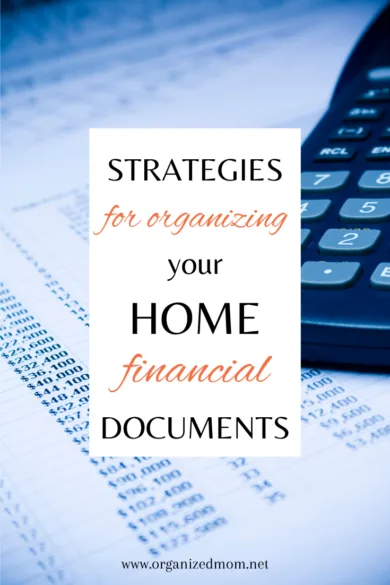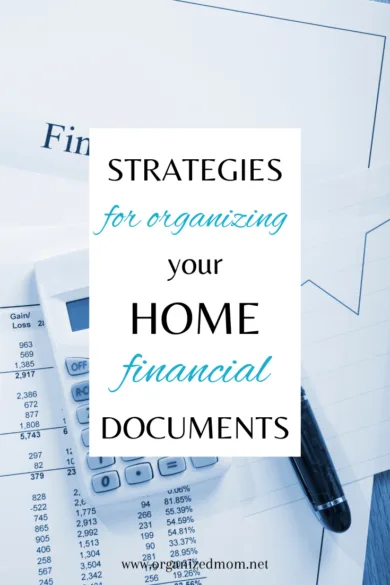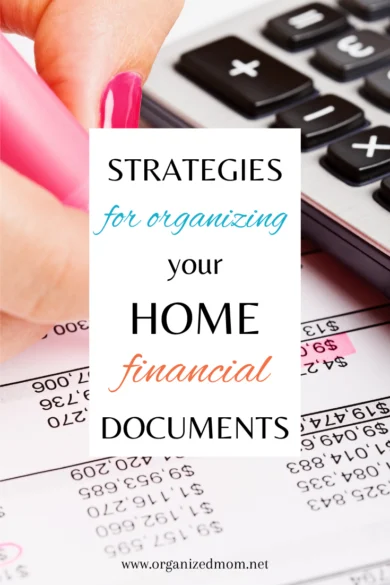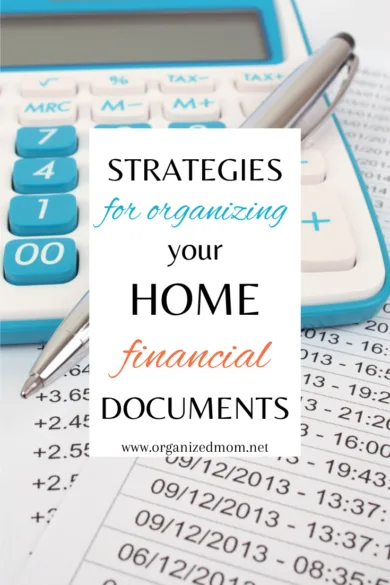Welcome to my blog post on strategies for organizing your home financial documents! Whether you’re a small business owner, a student, a retiree or a family, one thing is for sure, keeping your financial documents organized is just as crucial as organizing the rest of your home.
Not only does it make it easy to find important information when you need it, but it also helps you stay on top of your finances and make informed financial decisions.
In this post, we’ll be discussing various strategies for organizing your financial documents, both physical and digital.
From creating a filing system to digital organization and tax preparation, we’ll cover it all. We’ll also discuss the importance of ongoing maintenance to keep your financial documents organized.
By the end of this post, you’ll have a better understanding of how to organize your financial documents and you’ll be equipped with the tools you need to keep your financial life in order..yay!

Organizing Your Home Finances
Creating a Filing System
Creating a filing system is one of the most important strategies for organizing your home financial documents. Having a designated place for all of your financial documents ensures that you can easily find them when you need them, without spending hours searching through piles of paper.
One of the most effective ways to create a filing system is by using LABELLED folders or binders. These can be purchased at any office supply store and can be labeled with categories such as bills, taxes, bank statements, and insurance documents. This makes it easy to find the document you need, without having to sift through irrelevant papers. Another tip is to use dividers to separate the documents within the folders or binders.
Another option is to use a physical filing cabinet, which can be locked and provides more security for important documents, which is a good idea for all homes I would say.
The benefits of having a physical filing system are numerous. For one, it allows you to easily access and refer to documents without having to rely on digital devices or internet connection. Additionally, having a physical filing system makes it easy to share important documents with others, such as your accountant or lawyer. It also helps to minimize the risk of losing important information due to hard drive failure or cyber attacks.
Overall, a physical filing system is a simple and effective way to keep your financial documents organized, and make it easier to find the information you need.
Digital Organization
In addition to a physical filing system, using DIGITAL TOOLS for organizing your financial documents is also a great option. With the rise of technology, we now have access to a variety of apps and software that can help us keep our financial documents organized in a digital format.
One popular app that I really like for digital organization is Evernote. This app allows you to create notebooks for different categories of financial documents, such as bills, taxes, and bank statements. You can also add tags to each document for easy searching and add notes to each document for further clarification.
Another option is using cloud storage services like Dropbox, Google Drive, or OneDrive. These services allow you to upload and store your financial documents in the cloud, making them accessible from anywhere, and they also have the added benefit of providing automatic backups of your data.
When organizing your digital financial documents, it’s important to use keywords and tags to make searching for documents easy (a rookie mistake if you don’t).
This can include the name of the document, the date it was created, or any other relevant information. Using a naming convention for your documents can also be helpful in keeping them organized, such as using the date in the filename.
Additionally, it’s important to regularly review and delete old and unnecessary documents to keep the number of files in your digital filing system manageable.
Overall, using digital tools for organizing your financial documents provides convenience and flexibility. By utilizing apps and software like Evernote or cloud storage services, you can easily access your financial documents from anywhere and keep them backed up and secure.

Be Prepared For Tax Season
I totally get that tax season can be a stressful (and annoying) time for many, but keeping your financial documents organized can make the process a lot smoother. When it comes to tax preparation, having all of your financial documents in order is essential for maximizing deductions and minimizing stress.
One of the best ways to organize your financial documents for tax season is to create a separate folder for tax-related documents in my experience. This can include items such as W-2s, 1099s, and charitable donation receipts. This way, all of the documents you need for your tax return will be in one place, making it easy to find what you need.
Another tip for tax preparation is to keep track of any expenses that are tax-deductible. This can include things like business expenses, medical expenses, and charitable donations. By keeping track of these expenses throughout the year, you’ll be able to take advantage of all the deductions you’re entitled to.
Being organized for tax season also helps me to minimize stress and stay on top of deadlines. When my financial documents are in order, I’ll be able to prepare my tax return quickly and with confidence. This helps me to avoid last-minute scrambling to find important documents and also help me to avoid any potential penalties or interest charges.
Overall, keeping my financial documents organized for tax season is essential for making the process as smooth as possible. By creating a separate folder for tax-related documents and keeping track of tax-deductible expenses, I’ll be well on my way to a stress-free tax season and maximizing my deductions.
Ongoing Maintenance
As someone who wants to stay on top of my finances, ongoing maintenance is essential for me. Regularly reviewing and updating my financial documents is key to keeping my system organized and running smoothly too.
One of the most important things for me to do is to regularly purge old unused documents. This means going through my physical files and getting rid of any documents that are no longer relevant or necessary. This helps me to keep my filing system from getting cluttered, and it also helps me to ensure that I’m only keeping the documents that are truly important.
Another important aspect of ongoing maintenance is regularly reviewing my digital files. This means going through my digital financial documents, such as those stored in cloud-based apps like Evernote or Dropbox and making sure that they are up-to-date and organized. This can include updating account numbers, editing tags and keywords, and purging any old or unnecessary files.
Regularly looking over and updating my boring financial documents also helps me to stay on top of any changes in my financial situation.
This can include things like changes in my job or income or expenses, and also any changes in my family’s financial situation. By staying on top of these changes, I can ensure that my financial system is always accurate and up-to-date, and it’s not very hard!
Ongoing maintenance is important for keeping my personal financial system organized and running smoothly.
By purging old documents and regularly reviewing my digital files, I can ensure that my system is always accurate and up-to-date, which gives me peace of mind and helps me to stay on TOP OF IT ALL!
Bottom Line
So there you have it folks, some strategies for organizing your home financial documents. Whether you prefer a physical filing system or a digital one, the important thing is to find a system that works for you and stick to it. Trust me, the benefits of having a clean and organized financial system are worth the effort.
I encourage you to take some time to implement these strategies and make a commitment to keeping your financial documents organized. Whether you’re a busy mom like me or a busy professional, taking the time to organize your financial documents is a smart and proactive step that will pay off in the long run.
When your financial documents are in order, you’ll be able to make informed financial decisions and have peace of mind knowing that you have everything in order. It will also help you to avoid last-minute scrambling to find important documents, and help you to avoid any potential penalties or interest charges.
So be sure to give these tips a try and see the difference it makes in your life. And if you have any other tips or strategies that have worked for you, please share them in the comments below.




